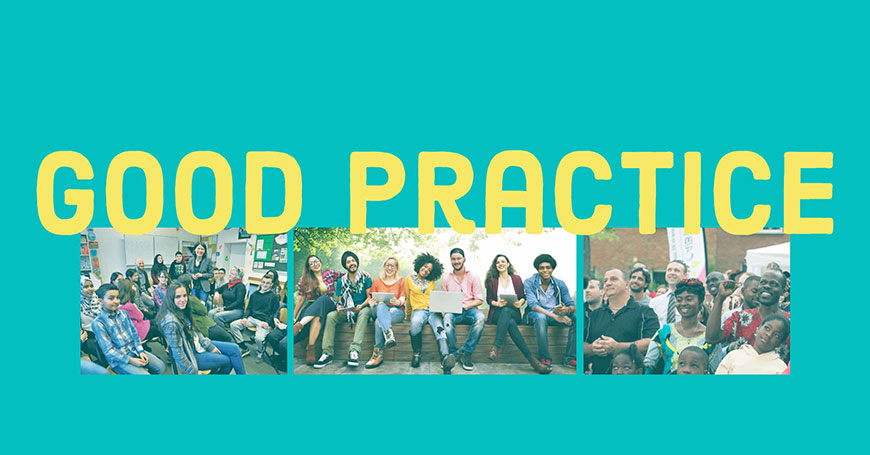Intercultural cities: good practice examples

The first step is the adoption (and implementation) of strategies that facilitate positive intercultural encounters and exchanges, and promote equal and active participation of residents and communities in the development of the city, thus responding to the needs of a diverse population. The Intercultural integration policy model is based on extensive research evidence, on a range of international legal instruments, and on the collective input of the cities member of the Intercultural Cities programme that share their good practice examples on how to better manage diversity, address possible conflicts, and benefit from the diversity advantage.
This section offers examples of intercultural approaches that facilitate the development and implementation of intercultural strategies.
Guided tours of the Greatest Hits exhibition by members of Erlangen Refugee Forum : The best of the 60s, 70s, 80s, and today - from the Municipal Collection of Erlangen
Purpose: To ensure digital inclusion Process: For the duration of the exhibition Greatest Hits (December 2017 to February 2018) the Kunstpalais offered guided tours in Arabic, Armenian, Persian,...
Committee for Diversity and Inclusion
Purpose: In December 2023 the city council of Stavanger decided to establish a Committee for Diversity and Inclusion (Norwegian: Utvalg for Mangfold og Inkludering) consisting of nine members (five...
Diversity in the workforce
Purpose: To ensure and encourage diversity in the workforce in Bergen municipality, by supporting and facilitating career development for people with a minority background. Stimulus/Rationale: The...
Safer Alta de Lisboa
A community-policing service based on intercultural principles Purpose: Since 2007, the Lisbon Municipal Police (LMP) has been developing a community policing strategy, seeking the maintenance of...
Siemens’ program for integrating refugees
Purpose: Erlangen shows that labour markets can open up to refugees under favourable circumstances Process: With a population of 100 000, the City of Erlangen is home to the University of...
House of Peace and Human Rights
Purpose: The House of Peace and Human Rights aims at disseminating the culture of peace, the promotion of human rights, peace processes and the recovery of historical memory. It does so in...
Intercultural Museum
Purpose: The aim of the museum is to exhibit and tell the history of diversity in Norway, conceptualizing the museum as a space of dialogue that involves as wide and diverse a range of people as...
Maio - Diálogo Intercultura / May Intercultural Dialogue
Purpose: May – Intercultural Dialogue is affirmed in Setúbal as a moment of sharing and joint work, with the aim of promoting intercultural dialogue and coexistence, through the promotion of...
Give Something Back to Berlin
Purpose: A social enterprise that treats refugees not as victims but bringers of diversity advantage Process: The “Give Something Back to Berlin” (GSBTB) foundation is a fine example of a civil...


